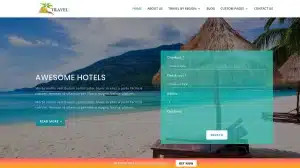Creating a Stunning Tourism Website with WordPress
Businesses in the tourism sector must have a strong online presence in the current digital era. An attractive tourist website may draw travelers, highlight places, and eventually encourage bookings. With WordPress’s user-friendly and flexible platform, you can quickly build an engaging tourism website that perfectly encapsulates your company’s travel services. We’ll take you step by step through the procedure in this guide. How to create a tourism website using WordPress?

Choosing the Right Hosting and Domain
It’s critical to choose the appropriate hosting and domain before starting to develop your travel website. Performance, security, and cost should all be carefully considered by your hosting company. A website that loads quickly improves user experience and raises its search engine rating.
Choosing a Domain Name
The choice of a domain name is an important one. It should be simple to remember and reflect your tourism company. Aim for a name that is catchy, pertinent, and contains pertinent keywords. When you’ve chosen a domain name, register it with a trustworthy domain registrar.
Installing WordPress
It’s time to install WordPress now that your domain and hosting are set up. One-click installations are available from many hosting companies, which makes this process simple and quick. To set up your website’s database and install WordPress, follow the provided instructions. For tourism website design read here.
Selecting a Theme
WordPress offers a huge selection of themes, many of which are designed for the travel and hospitality sector. Choose a theme that complements your brand’s identity and efficiently promotes your destinations by looking through the available possibilities. Make sure the theme is responsive, which means it can easily adjust to various screen sizes.
Customizing Your Website
After deciding on a theme, it’s time to modify your website to make it stand out and look good.
Adding Essential Plugins
Plugins are addons that improve the operation of your website. Install plugins like “WP Travel” for booking management, “Yoast SEO” for content search engine optimization, and “WPForms” for user-friendly contact forms if you have a travel-related website. Click here.
Creating Compelling Content
The center of each successful tourism website is its high-quality content. Write captivating blog entries, provide eye-catching photographs of your travels, and craft engaging descriptions. Use simple, direct language, and logically arrange your content to make it easy to navigate.
Optimizing for SEO
Enhancing your website’s presence in search engine results requires search engine optimization (SEO).
Keyword Research
Choose appropriate search terms that people might use to find places like yours. Include these keywords in your content naturally by including them into page names, headings, and image alt tags.
Optimizing Page Speed
Your SEO may suffer if your website is too slow. To make sure your website loads quickly, optimize images, enable browser caching, and think about employing a content delivery network (CDN).
Engaging User Experience
The best way to keep website visitors on your page and entice them to look through your travel options is to provide a simple and enjoyable user experience.
Mobile-Friendly Design
Considering that a sizable percentage of internet traffic now originates from mobile devices, you should make sure your website is fully responsive and offers a fluid user experience on all screen sizes.
Clear Navigation
Create a user-friendly navigation menu that enables visitors to quickly locate critical information, such as location specifics, travel alternatives, and contact information.
Finalizing Your Website
To guarantee a seamless user experience, analyze and test every component of your travel website before launching it.
Testing and Debugging
Test every aspect of the operation of your website, including the booking forms, contact forms, and payment gateways. Fix any problems or errors that appear during testing.
Optimizing for Speed
To guarantee that your website loads quickly on different devices and browsers, perform extra speed tests. Images should be compressed, and extra code should be removed from your website.
Launching Your Tourism Website
Congratulations! Your tourist website is now ready to go live and to begin drawing in visitors from all over the world.
Announcing the Launch
Use social media, email newsletters, and any other marketing tools you may have to let people know about your new website. Encourage happy clients, loved ones, and friends to spread the word as well.
Monitoring and Updating
Use programs like Google Analytics to frequently check the performance of your website once it goes live. In order to maintain your website interesting and relevant, you need regularly update your material, add new locations, and address customer comments.

It doesn’t have to be difficult to build a WordPress travel website. You can build a visually appealing and user-friendly platform that inspires tourists to discover the distinctive experiences your company has to offer with the correct strategy and a little imagination. If you follow the instructions in this tutorial, you’ll be well on your way to building a strong web presence for the travel and tourist sector. How to create a tourism website using WordPress?







